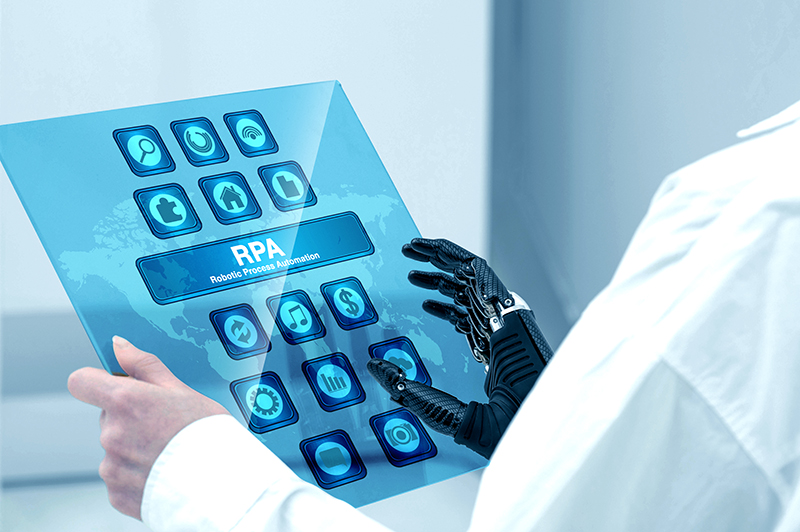Healthcare organizations tend to deal with and process a huge amount of data and information on a day-to-day basis. Arising from various internal and external sources, healthcare data may include – lab information systems, clinical applications, third-party portals, radiology information systems, insurance portals, scheduling applications, HR applications, and ERPs. In addition, integrating the flow of information across all these channels is a challenging and time-consuming task. The significance and scope of automation becomes evident at this point. Generally, the automation process is considered for industries that can displace the low-skilled workers. However, the healthcare industry is one that could efficiently handle pressure by implementing robotic process automation (RPA) in healthcare processes. A report published before the pandemic stated that RPA in the healthcare industry will generate an annual value of $350 billion to $410 billion by the year 2025. The deployment of robotic process automation in healthcare organizations can play a vital role in improving operational processes while reducing their costs. Partnering with a robotic process automation company is the best way to implement innovative automation technologies that can take healthcare businesses to the next level.
What can RPA Bring to Healthcare?
The healthcare industry is full of standards, protocols, rules and compliance requirements. In fact, these standards are considered the starting point for quality care, even if they are not directly related to the treatment itself but business processes or data management. However, that is just part of a challenge. A natural sequence of strict regulations is that employees are engaged in tedious tasks, like inputting patient data or moving it across several systems. Being error-prone, these tedious tasks can often lead to boredom resulting in increased turnover.
Robotic process automation (RPA) can virtually automate any repetitive and manual task, critical to the functioning and processing of healthcare. The technology leverages software robots or just bots, to execute high-volume repetitive tasks in a digital environment. Considering the algorithmic nature of RPA bots, they are a perfect fit for taking care of tedious scenario-based tasks present in the healthcare system. The technology can encourage a new workforce because of empowerment in terms of intelligent tools extracting relevant information from several sources, partner ecosystems, EHRs, finance systems, payer portal systems, and accounting systems. RPA can help the healthcare industry reduce costs, limit the occurrence of errors, and improve operational efficiency.
Scope and Benefits of RPA in Healthcare
In the healthcare arena, healthcare professionals carry out several cumbersome and tedious administrative activities manually. Apart from ensuring the correctness of the work, ensuring to follow the rapidly evolving healthcare laws and regulations can be quite challenging. However, the evolution of RPA (robotic process automation) has brought about a radical change in the healthcare industry. By implementing RPA, it is possible to provide personalized care while reducing the overall costs and improving the quality of care. This ensures maximum compliance with the laws and regulations while reducing errors/mistakes, and in turn, increasing operational efficiency.
The healthcare industry functions in real-time with no windows for delay and mistakes. Reports estimate that the industry collectively spends a stunning $2.1 billion each year on poorly performed and error-prone manual tasks around provider data management alone. Similarly, insurance companies spend somewhere between $6 million to $24 million annually to rectify poor provider data quality. Typically, automation is applied to those tasks that utilize structured data and logic where the decisions are made based on a predefined set of rules. With capabilities like natural language processing (NLP) and optical character recognition (OCR), the unstructured data sets can be structured and used for automation. Integration of RPA with AI (Artificial Intelligence) creates cognitive automation that performs human-like tasks through bots. Here discussed are some key examples or scope of healthcare automation solutions –
- Patient Experience – It is estimated that for every medical problem or condition, a visit to a specialist and regular follow-up visits are necessary as the patient prefers to interact with a person to discuss their health issues and symptoms. However, with the use of AI-powered platforms, possible treatments with a personal touch can be used in between the scheduled visit to the clinic. This provides healthcare providers enhanced efficiency. For instance, automating the vaccination schedule up to a certain age is another example of understanding how to enhance patient experience. By employing software bots, you can calculate the vaccination schedule, followed by sending reminders to parents before the scheduled vaccination date.
- Medical Transcription – With natural language processing (NLP), the machines can effectively be trained to transcribe and edit the reports dictated by medical specialists and other healthcare practitioners. In addition, machine learning algorithms can convert speech into text for report generation.
- Clinical Decision Support – In order to arrive at a definite diagnosis of a condition and analyze various medical reports and evaluate past medical history, RPA can be utilized. With the integration of AI and Intelligent Automation, these tasks can be performed automatically without missing any data point. This will help the medical specialists to provide their patients with a better-personalized treatment in a holistic manner.
- Optimizing Staff Utilization – The healthcare industry faces challenges in terms of specialized staff shortage. By utilizing the manpower with the right optimization for the primary job, healthcare automation solutions can bring big relief.
- Inventory Management – In order to provide a top-notch patient experience, it is essential to ensure that the medicine inventory is effectively monitored and stock levels are maintained correctly in the healthcare facility. Automation in healthcare can be employed to track the inventory. The technology can further be integrated with vendors to automate the maintenance and requirement process.
Utilizing RPA in Healthcare – Key Benefits
According to reports from Gartner, 20 percent of all patient interactions will involve some form of AI enablement and RPA is one such advanced technology that is helping healthcare organizations. The report also states that 50 percent of the US healthcare service providers will invest in RPA in the next three years. Here discussed are some of the benefits that RPA offers to healthcare organizations –
- Better Compliance – RPA technology can be utilized to improve compliance in hospitals and other healthcare organizations. As software robots strictly follow predefined rules, you can ensure that each process has all the necessary boxes checked. For instance, it is possible to ensure the workflow’s compliance regarding temporal rules, such as whether a lab test is performed within 24 hours after a visit to the clinic.
- Improved Data Security – Data transfer tends to be more secure in automated processes. For example, a common compliance violation is unauthorized employees accessing private patients’ health records, such as blood test results. Even if this is not intentional, the paper records are quite easy to access. Often, the reason for this is the need to manually process a large amount of data. Automated processes limit access only to the authorized person, making it secure. By assigning this type of task to bots, you can process health records without the need for employees to access it, making it more secure. In addition, storing the data electronically, extracting the same and migrating it for various purposes like research or second opinion, can be done securely with the help of RPA implementation.
- Reduced Cost – RPA for healthcare offers substantial savings by performing the tasks more efficiently without errors in lesser time. This in turn adds to saving on human resources costs. This also helps eliminate the repeated tasks due to errors in compliance and ensure improved patient care. According to CQAH’s study, the healthcare industry can save up to $13.3 billion in a revenue cycle by automating the processes.
- Better Employee Satisfaction – By implementing healthcare automation with RPA, employees get relieved from repetitive, tedious and error-prone workflows. By delegating such tasks to RPA bots, employees can spend more time on patient care, not paperwork. This frees up their time to get involved in strategic and intelligence-based roles thus enhancing their consistent growth and learning. The growth opportunities and the feeling of adding value to the company automatically increase employee satisfaction levels
- Increased Appointment Turnout – RPA technology can help automate appointment scheduling without the intervention of the hospital administrative staff. This will eliminate the need for resources and help improve customer experience since the appointments can be arranged at a much faster pace. By sending reminders through RPA bots, the patient is less likely to forget about the appointment which will increase the appointment turnout. The patient admission and discharge process can be optimized by providing higher levels of customer service.
- Personalized User Experience – Healthcare automation can reduce the burden of time-consuming administrative tasks by taking them over from humans. Software bots can complete these tasks quickly. This results in better patient satisfaction as they receive information instantly and accurately.
In today’s era, automation is the most talked about and adopted technology. Specifically, when it comes to the healthcare sector, healthcare companies should neither delay nor compromise on implementing the automation process. By implementing RPA to carry out administrative tasks, healthcare institutions can significantly improve operational efficiency and productivity. Experienced business process outsourcing companies can ensure the accuracy of healthcare processes and data.
The top use cases of robotic process automation (RPA) and things to consider while implementing RPA in the healthcare industry will be discussed in our next blog.




